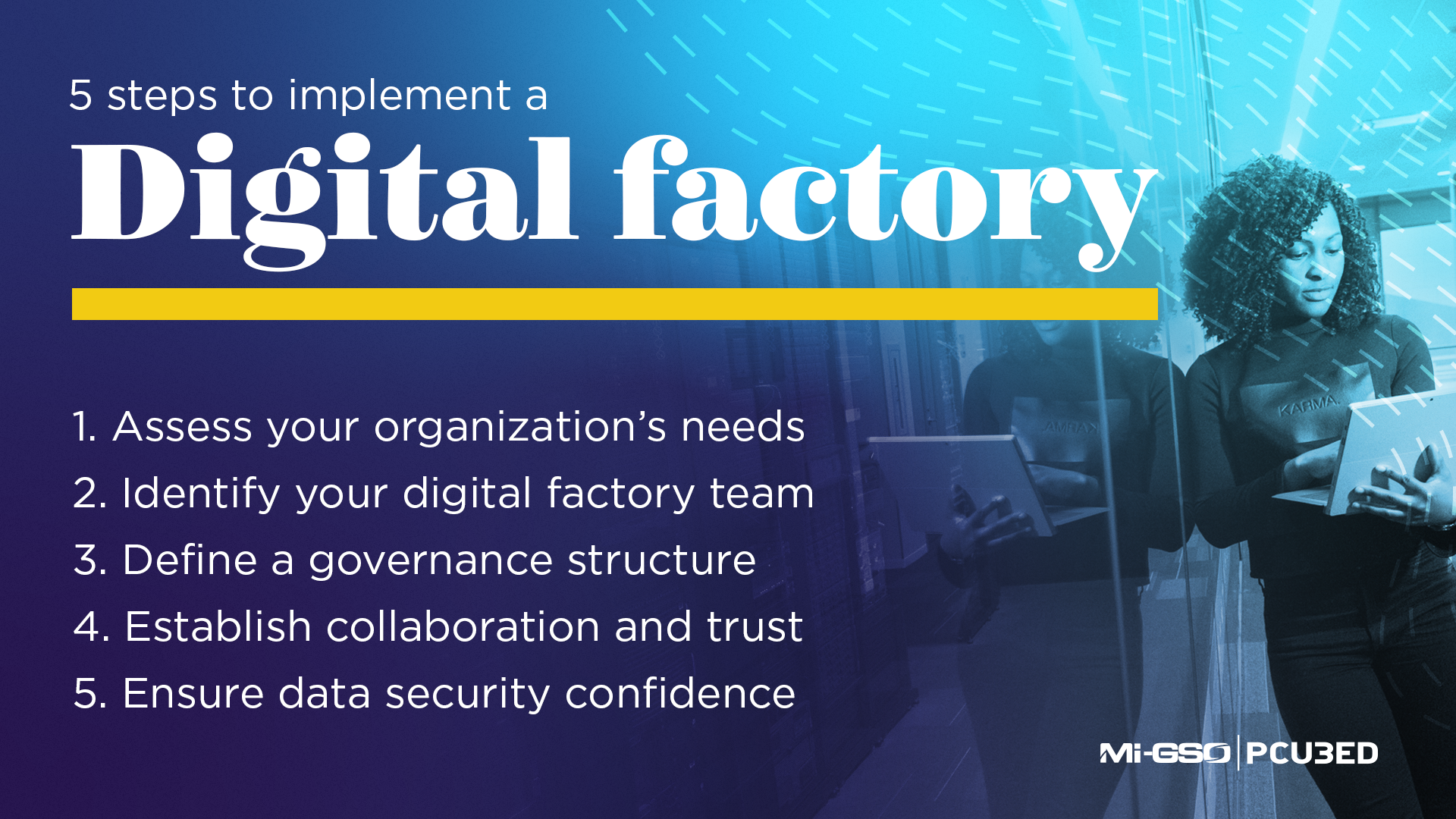Our website is not supported on this browser
The browser you are using (Internet Explorer) cannot display our content.
Please come back on a more recent browser to have the best experience possible

Many organizations have a team that specializes in data analysis and visualization, or that primarily develops and maintains Digital Dashboards. In today’s pace of technology, however, companies need to take digital development a step further to provide customized solutions rather than simply crunching data. That’s where the Digital Factory comes in.
In this article, we will discuss what a Digital Factory is and how it supports advanced business capabilities as well as the best way to implement a digital factory into your organization.
A Digital Factory is a team specialized in innovation and product development that provides custom digital solutions through the development of adaptive software and applications. By going beyond simply analyzing and visualizing data for reports, this team provides innovative solutions that adapt to the organizations’ needs.
In addition to developing custom solutions that fit the context of the organization, the Digital Factory also provides a suited implementation process that supports all those impacted by the solution.
One of the greatest benefits of a Digital Factory is adaptability; they adapt solutions depending on the needs of their stakeholders. Therefore, companies with a Digital Factory are able to develop more innovative solutions and add value to their customers versus their competitors.
For example, because the team is multidisciplinary, they enable solution discussions from various aspects and points of view, making their solution more complete and efficient through an innovative approach. They are also proactive and challenge their stakeholders to discover better solutions that respond to their needs. The team is also able to solve day-to-day problems by digitalizing and restructuring processes to make them more productive.
Read also: The Digital PMO: An In-depth Look
The Digital Factory enables many possibilities for the business, among them include:
This multidisciplinary team can tackle problems brought by customers on several fronts, which guarantees a much more complete solution than if it were solved by a team of developers only. In addition to the versatility of the Digital Factory team, it is important that the team is fully dedicated to this purpose so that it can reach its full potential and ensure an innovative business development.

First, it is important to assess the needs of your organization. This will help you to set the objectives of your Digital Factory and ensure they align to your organization’s development plan. What are the needs of the stakeholders? What will be the scope of this team? What areas of the business will they support?
Second, identify who will be on your Digital Factory team. Consider if the team will be engaged for a specific duration and if it is best to partner with an external organization. Keep in mind that this team also acts as a liaison between the PMO and the development side. They must be able to provide inputs from the PMO while contributing to the solution development and supporting its implementation. Also, it is fundamental to have a multidisciplinary team that will attack the challenges in their various aspects, developing a more complete solution with much more added value.
It is fundamental to also define the governance structure for your Digital Factory as well as the infrastructure needed for it to develop. The infrastructure will complement the governance approach as well as the work methodology that generally occurs within an Agile context. The Agile work context is generally chosen due to the need for flexibility in the delivery of solutions.
Additionally, we cannot forget the importance of establishing a relationship of collaboration, partnership, and trust with the stakeholders for whom the digital solutions will be developed. In general, the stakeholders’ concerns should shape the solution based on their processes. Therefore, it is important to have an open feedback cycle and the solutions adapted to their needs, along with all the necessary support.
Lastly, confidence in the security of the organization’s data treatment is also fundamental for the proposed solutions to be reliable. After all, customer relationship and data security is fundamental for solutions to be well integrated.
Improved Project Management capabilities is one of the objectives a Digital Factory should be focused on. After all, the tools they develop intend to support more efficient processes and inform better decision making. In the end, most of the tools the Digital Factory develops will be used by PMO in order to help them to follow up on their projects and make decisions.
However, although the output of the Digital Factory can enhance an organization’s project management, the company must use these capabilities in turn to support the Digital Factory as well. For example, a new product that needs implementing within the organization will likely require change management to best integrate it among their project teams.
MIGSO-PCUBED’s Digital Factory emerged to provide a more complete service to our customers. It consists of a multidisciplinary team of developers, designers, automation experts, data analysts, and PMO testers, all with the focus to enhance an organization’s project management capabilities.
On the technical side, this team supports the development of new digital tools through our PMO as a Service (PMOaaS) offering or provided directly to our clients for specific needs. The applications are essentially web-based, with data security and a very easy and customized integration.
On the process side we, as PMO experts, also offer full support for implementation and adaptations when necessary. Being completely integrated into our clients’ organizations and knowing a certain extent about their needs, our PMO consultants also play a key role in the development of our applications. In this sense, our consultants not only support the implementation of new software, but they also cooperate with the solution development team to provide end-to-end service for fully customized solutions.
Although there is no standard Digital Factory format, it is important to keep in mind the main aspects involving its implementation and what it can add to your PMO service. Furthermore, it is also important to realize the big difference between the solutions created within a Digital Factory and those in traditional development teams, presenting much more added value and a more complete service adapted to each type of clients challenge.
This article was written by Lalleska ARAUJO.
More on the same subject
Loved what you just read?
Let's stay in touch.
No spam, only great things to read in our newsletter.
We combine our expertise with a fine knowledge of the industry to deliver high-value project management services.
MIGSO-PCUBED is part of the ALTEN group.
Find us around the world
Australia – Canada – France – Germany – Italy – Mexico – The Netherlands – Portugal – Romania – South East Asia – Spain – Switzerland – United Kingdom – United States
© 2024 MIGSO-PCUBED. All rights reserved | Legal information | Privacy Policy | Cookie Settings | Intranet
Perfect jobs also result from great environments : the team, its culture and energy.
So tell us more about you : who you are, your project, your ambitions,
and let’s find your next step together.
Dear candidates, please note that you will only be contacted via email from the following domain: migso-pcubed.com. Please remain vigilant and ensure that you interact exclusively with our official websites. The MIGSO-PCUBED Team
Choose your language
Our website is not supported on this browser
The browser you are using (Internet Explorer) cannot display our content.
Please come back on a more recent browser to have the best experience possible
